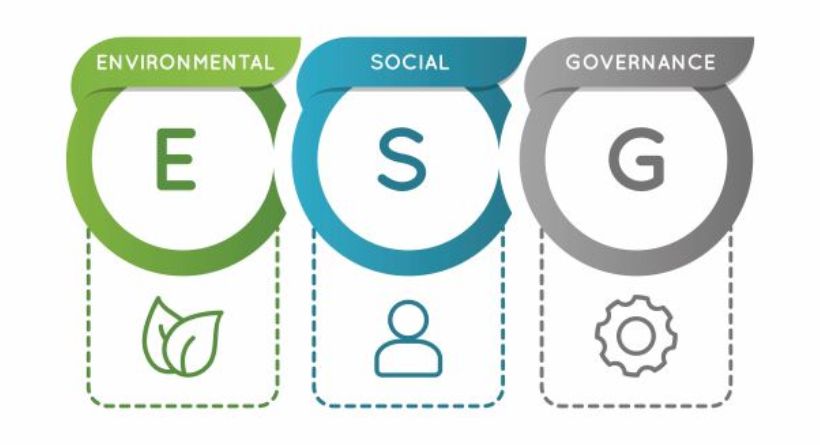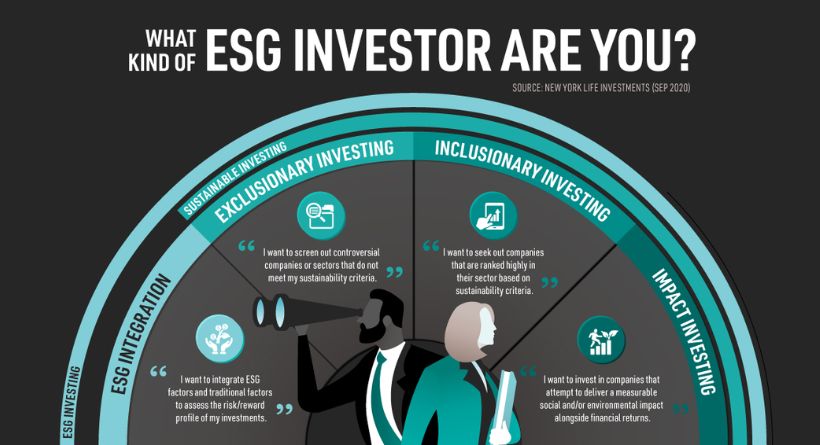Environmental, social, and governance, or ESG, refers to the three crucial elements when assessing the sustainability and moral effect of a financial investment in a corporation or a business. The majority of socially conscious investors evaluate businesses using ESG criteria when evaluating investments.
It is a general phrase used in capital markets and frequently used by investors to assess corporate behavior and forecast future financial results.
The environmental, social, and governance factors are a subset of non-financial performance indicators that cover moral, environmentally friendly, and corporate governance concerns. These concerns include things like putting systems in place to ensure accountability and reducing the corporation’s carbon footprint.
From the start of this decade, there have been an increasing number of investment funds that include ESG considerations, and this trend is anticipated to continue over the next ten years.
The three main components of ESG are:
Environmental criteria, which assesses how an organization manages our environment, focuses on:
- litter and waste
- resources running out
- release of greenhouse gases
- deforestation
- global warming
Social criteria, which examines how a firm treats its customers, focuses on:
- Diversity and employee relations
- circumstances of employment, including slavery and child labor
- local areas; specifically tries to sponsor initiatives or organizations that
- will provide for underprivileged and needy populations worldwide.
- safety and health
- conflict
Governance criterion evaluates how an organization governs itself and places particular emphasis on:
- tax planning
- compensation for executives
- political contributions and lobbying
- both bribery and corruption
- board composition and diversity
Socially responsible mutual funds and exchange-traded funds should be taken into consideration if you are an investor looking to purchase ESG-screened stocks.
In order to find investments that properly reflect your own beliefs, you will need to conduct your own study because experts suggest that what makes an adequate collection of ESG criteria is subjective and relies on your priorities.
Also Read More At: Business One Online
ESG and the realm of alternative investing
ESG criteria are progressively taking center stage in the realm of alternative investments. ESG concerns may significantly affect the return profile and long-term risk of investment portfolios, thus they are crucial to consider when assessing the sustainability of non-financial consequences of investments.
According to a recent study, investors who pick assets that have undergone ESG screening benefit from a “double dividend” of reduced risk and improved **rates of return.
Businesses that implement ESG principles are generally deemed to be more responsible, less risky, and thus more likely to achieve their long-term commercial goals.
The ESG framework is gaining popularity among traditional investors, and many of them have started applying its criteria for determining risk in the investment decision-making process.
a private investment management firm devoted to managing and launching cutting-edge goods, TriLinc Global LLC.
“ESG standards add an additional layer of investigation, which is excellent for shareholders. It became clearly evident that this was not a passing trend when the UN formed UNPRI in 2006 and watchdogs like Bloomberg and MSCI began tracking ESG.
“ESG weeds out unsustainable organizations with antiquated processes and detrimental side effects, while simultaneously decreasing risk for investors as they invest in more ethical enterprises with a higher possibility of long-term success.”
ESG-screened investments make wise choices.
While looking for investment prospects, it is now customary to take environmental, social, and governance concerns into account.
Value-motivated and values-motivated investors presently evaluate ESG problems across all asset classes using a variety of different approaches.
There is a fallacy that investing socially conscious money means you will lose money; in truth, this is frequently not the case.
Usman Hayat, CFA, and Matt Orsagh, CFA, CIPM wrote the following in an essay last year titled Environmental, Social, and Governance Problems in Investing: A Handbook for Investment Professionals:
The totality of empirical evidence does not support the persistent misconception that ESG factors have a negative impact on financial success, according to the study.
“A major assumption in the debate of ESG concerns for investment professionals is that systematic ESG consideration would probably result in more thorough investment assessments and better-informed investment decisions.”
* The Certified Financial Analyst (CFA) certification is provided by the CFA Institute, which has its headquarters in Charlottesville, Virginia.
Christoph Klein CFA asserts in a different paper from the CFA Institute titled “Integrating ESG into the Fixed-Income Portfolio” that the use of ESG criteria in fixed-income analysis can lower portfolio and idiosyncratic risk while enhancing performance by “helping investors anticipate and steer clear of investments that may be subject to credit rating downgrades, widening credit spreads, and price volatility.”
According to the Financial Times Lexicon, environmental, social, and governance issues include:
Investors use the general term “ESG” (environmental, social, and governance) in the capital markets to assess business behavior and forecast future financial performance of organizations.
ESG elements are a subset of non-financial performance that take into consideration concerns with sustainability, ethics, and corporate governance, such as how a firm manages its carbon impact and if it has procedures in place to ensure accountability.
The mindsets of people are evolving
More than 300 investors with long-term savings and investments totaling at least £500,000 ($700,000) participated in a poll conducted by Google and Impax. The objective was to ascertain their views on climate change in the wake of the COP21 Conference in Paris.
Some of the survey’s results are listed below:
- The majority of responders, 70%, expressed worry about climate change.
- 3% of respondents claimed to have taken measures to avoid investing in fossil fuels while also purchasing sustainable/clean energy equities.
- 5% reported to have investments in renewable energy, energy efficiency, or sustainability at the moment.
According to Hamish Chamberlayne, an SRI manager at Henderson Global Investments, who is quoted by Nyree Stewart in the Financial Times:
The transition to a low-carbon economy will take place globally over the course of the next few decades, and it will be one of the largest investment events in human history, according to the big picture.
The transition to an economy that is significantly less dependent on carbon will cause significant disruption to long-standing industries, geopolitical relationships, and how the global economy functions. Our current global economy is approximately $80 trillion (£56.3 trillion) and is heavily reliant on carbon. Both hazards and possibilities will be enormous in the upcoming 10 to 20 years.









